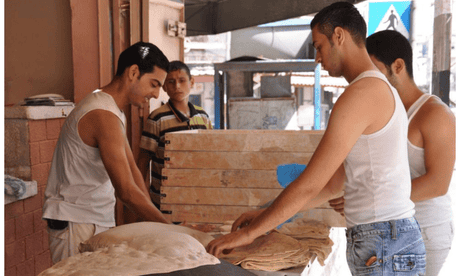‘Everyone and their bubbie is here’: a lively Jewish Sabbath at a Palestinian restaurant in Brooklyn
Ayat, which has faced hate since 7 October, fed a packed room of people dancing, praying and breaking challah bread
O
“Everyone and their bubbie is here,” a graduate student said, bumping into friends from leftist, progressive, and queer communities.
They were all there for a Jewish Sabbath meal hosted by the restaurant, which has faced a steady stream of hate since 7 October for its vocal support of the Palestinian cause. But on Friday, the mellow, dirge-like melodies of Moroccan Jewish songs filled the restaurant’s second floor, where the walls were covered with hand-painted murals depicting folkloric Palestinian symbols and a vintage Arabic ad for Pepsi. A standing-room only crowd joined in with dancing and table banging.
More than 1,300 people lined up and down the block to support the restaurant’s owners, Abdul Elenani and Ayat Masoud, many wearing keffiyehs and embroidered yarmulkes, others with tzitzit (Jewish ritual fringes) flowing out of shirts or in hijab.
“My only goal and my only motivation behind this concept when I created it was to speak through food and culture about the occupation of Palestine,” Elenani told the Guardian.
He jumped on the controversy to find common ground between communities of different faiths seeking an end to the Gaza war. “So why don’t I just throw a large Shabbat dinner during these difficult times?” he said.

Elenani and Masoud, who are married, started the restaurant in 2020 in Bay Ridge, a Brooklyn neighborhood that is home to one of the largest Arab-American populations in the US. He had always wanted to open a branch in Brooklyn’s Ditmas Park, a quiet family neighborhood that he saw as the perfect spot for Jews, Christians and Muslims to gather. But when he launched the sixth outpost of Ayat in December, there was an uproar – over the seafood menu.
Headlined “From the River to the Sea”, the title of the fish menu was a cheeky callout to an enduring slogan of Palestinian protest. “It didn’t have any evil meaning to it whatsoever,” Elenani, 31, told me. But since 7 October, it struck a different chord for people who view it as a call to violence against Israeli Jews. He added a disclaimer to make clear the label was not inciting violence, but “signifies peace, and freedom”.
The disclaimer did not work. The New York Post ran a story about the menu last month. A neighborhood Facebook group was up in arms. Some posters called the restaurant “openly genocidal”, and bomb threats and bogus one-star Yelp reviews poured in.
They also received plenty of support, including from a growing movement of progressive Jews. Elenani, who is Egyptian American, and Masoud, who is Palestinian, reached out to friends, who connected him with Jewish groups organizing against the war, to bring communities together at a time of profound division.
On Friday, as hundreds stood in line for a free meal, a band played klezmer music. Local politicians greeted constituents. They chatted in English and French, Arabic and Hebrew, about Elenani’s generosity and warmth. A six-foot long challah bread waited for them inside.

Elenani wanted observant Jews to feel welcome and, even after three caterers turned him down, arranged for kosher food. A sign in the restaurant window said: “Down With the Occupation”. A dozen or so volunteers from Jews For Racial & Economic Justice, in neon vests, directed the queue and made sure everything went smoothly.
After sundown, a white tent set up outside became a sacred space for a service led by Jewish people from the Middle East and North Africa – Arab Jews, as some consider themselves. Musician Laura Elkeslassy began leading the service with an invocation focusing on the atrocities of 7 October, the plight of hostages, displaced people and political prisoners, and Israel’s ongoing destruction of Gaza.

She spoke of how the establishment of the state of Israel in 1948 led to a rupture between Arab Jews and their countries. “May this Shabbat bear the hope of a free Palestine and a collective liberation for all of us,” she said, as the worshippers ululated. The service concludes with the Mourner’s Kaddish, a prayer the bereaved chant to grieve close family members. A community leader invited the whole tent to stand up and say it together for those who have no one to remember them, a tradition that dates to the years after the Holocaust and has taken on new salience, as Israel has wiped out whole Palestinian family trees in Gaza. “Each one of us feels a huge loss,” she said.
Then came warm shouts of “Shabbat Shalom” and applause for Ayat’s owners, and the worshippers headed toward the buffet of slow-cooked chicken and lamb, yellow rice, garlicky baba ganouj, creamy hummus, and of course, herb-covered fish.


And what about the lightning-rod menu? “‘From the River to the Sea’ doesn’t frighten me,” Maya Herman, an Israeli anti-occupation activist, said, as she lingered near the kitchen. “I would also not spend many hours fighting over one sentence.”
Neighbors who stopped by for dinner agreed. “The restaurant reaching out to the Jewish community and saying we want to give back, and inviting Jewish people: I think it’s tremendous,” Howard Edelbaum said, over a plate of fish and rice.
Elenani, in a long tangerine parka, stood at the entrance downstairs and spoke with Shahana Hanif, the councilwoman for nearby Brooklyn districts and daughter of Bangladeshi immigrants, who wore a keffiyeh. “I know what our communities are capable of, and our long history of organizing, and eating together,” she told me. “This, for me, is the Brooklyn I grew up in.”
“It’s always been a dream of mine to have a kosher/halal restaurant with two kitchens,” Elenani said, and tonight was a first step.


As midnight approached, the kitchen kept sending out more aluminum trays. The enormous challah looked ripped by a thousand hands from the community who broke bread together.
Two Brooklyn rabbis sat together near the stairs, talking about how so much of their flock feels ostracized from their families and from synagogues openly supporting Israel.
Rabbi Abby Stein imagined a new Jewish life “in partnership with Palestinians, not just to stop killing, but also to truly build community”. Rabbi Miriam Grossman nodded. “The majority of the people here have been at actions to free Gaza,” she said, holding a tote-bag for the group Rabbis for Ceasefire.
A tray passed by heaped with baklava to share. “Shabbat is a time to rest and renew,” Grossman said, “and when Shabbat ends, we’re back at it.”

